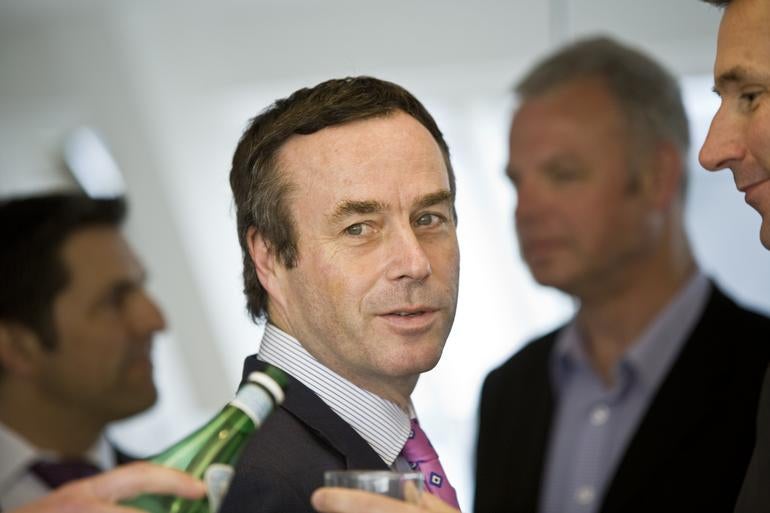
Financial Times editor Lionel Barber has outlined his vision of how the UK press should be regulated after the ‘watershed’News of the the World phone-hacking scandal.
Delivering his Fulbright lecture today titled “Adapt or die: The future of news and newspapers in the digital revolution”, Barber argued that the Press Complaints Commission in its current form was ‘dead’because it had lost public confidence.
“The PCC – whatever its qualities – has shown itself to be incapable of regulating the media’s baronies,’he said. ‘Whether or not that view is fair is irrelevant.”
The new watchdog – possibly called the Media Standards Commission – should be opened up to ‘outsiders”, while journalists themselves would have to be ‘a bit more open about the way we do business”.
‘We are not members of a secret society,’he said. ‘Other professions such as bankers and politicians have suffered similar scrutiny.”
Building on the work of the PCC, the new look press regulator would have the power to impose ‘real sanctions’including ‘timely and prominent redress for corrections or adverse adjudications”.
Barber described the question of whether it should be granted investigatory powers as ‘problematic”, though he conceded it would be a ‘serious weapon to combat wrongdoing”.
‘Any investigations would require a fairly high threshold, to be approved by the appropriate (and independent) committee of the new self-regulatory body,” he said.
‘Otherwise, letting loose a trigger-happy team of investigators would be costly and open to abuse.”
The current PCC system was ‘dangerously close to a la carte’in terms of those who participate, he said, and it is vital that the whole industry participates in the new system if it is to work.
Organisations who attempted to out of the system, ‘a la Express Newspapers”, could face a form of ‘statutory levy on advertising revenues for non-participants, with such levies being used to fund the new body”.
Speaking at the British Library Eccles Centre for American Studies, Barber said he believed that any new regulatory system should also include new media outlets like the Huffington Post or the politics blog Guido Fawkes
This was to ensure both a ‘level playing field’and account for the fact that ‘new media’is blurring into reporting and ‘old media’is increasingly using blogging, tweeting and other forms of social media.
Commitment to quality
Barber went on to explain how in an increasingly ‘splintered media landscape’the FT had reacted to the challenge of the digital revolution.
First was a ‘commitment to quality’and journalism that was ‘deep, original and above all accurate”.
While some point to the FT’s advantage of dealing in financial news that was a ‘commodity consumers are willing to pay for”, Barber claimed this did not do justice to the ‘transformation’it had achieved.
He cites several reasons for its success including the fact it has doubled the price of the newspaper in the UK, which ‘sent a powerful signal to the market and to our own journalists that the FT is a premium product”.
‘Second, we rapidly developed our subscription business, both digitally on FT.com and in newspaper form to reduce our dependence on advertising,’he said.
‘That way we also reduced our reliance on the casual purchaser in favour of the loyal subscriber.”
Another reason was the fact it ‘swung firmly behind the principle of charging for content’with its ‘meter model based on frequency of readership”.
‘Four years on, the meter model has proved to be an industry pioneer and an unequivocal success,” he said.
‘The FT now has nearly four million registered users, a combined paid print and digital circulation of 585,000 and a combined print and online average daily readership of over two million people worldwide.
‘Other publications, notably the New York Times, are now adopting similar paid meter models and, by all accounts, have met with promising results.”
He continued: ‘Fourth, we abandoned or revised arrangements which allowed other news providers or aggregators to sell our content to third parties in return for a fee.
‘In future, we determined, we would sell direct to our customers or offer our distributors a licensing arrangement.
‘And we would aggressively pursue any party seeking to circumvent our pay walls through cookies or sharing of passwords.’This was complemented by ‘sweeping editorial changes… founded on the principle of the integrated newsroom”
Content pirates
Barber went on to describe news aggregators as ‘content pirates”, arguing that “wholesale copying of original content cannot be considered a legitimate journalistic enterprise. ‘Even powerful aggregators such as Google have recognised as much; others should follow suit,’he said.
While sites like HuffPo and the Beast had begun to invest in their journalism, Barber argued that ‘neither can seriously match the deep and original reporting of the New York Times in say Afghanistan or Iraq”.
‘Some would happily conflate the notion of the free press with access to free content, but this is a road to perdition,’he said. ‘Serious journalism costs serious money. As one news wag put it: ‘Journalism wants to be free. Journalists want to eat.”
Email pged@pressgazette.co.uk to point out mistakes, provide story tips or send in a letter for publication on our "Letters Page" blog






